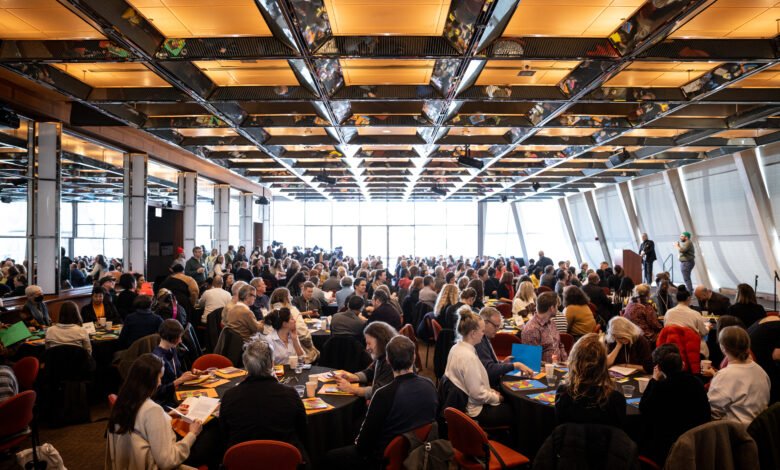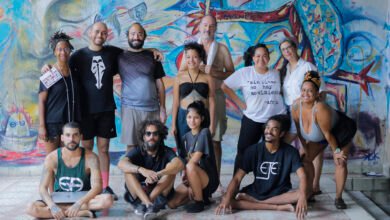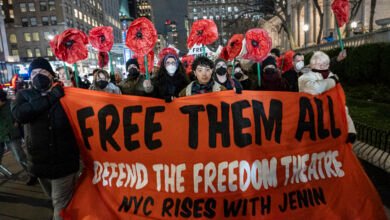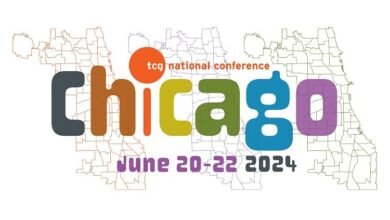
I was in the room to document the event and report about it here in the HowlRound Journal. I floated from table to table as each set of provocations circulated, catching bits of conversations. (One of my favorites: an attendee at one table began the session by producing two small bottles from her purse and saying, “in the spirit of collectivity, I’m offering moisturizer and hand sanitizer.”) Over the next few hours, and across twenty-five simultaneous conversations, groups took on the provocations of the day with care. Attendees returned frequently to the relationship between theatre and governments, boards, and funders; to the distinctions between local, national, and global perspectives in theatremaking; and to their budgets. As was the case in the morning, the idea that theatre practitioners are operating within broken, oppressive systems was taken as a given. So we might see the topics that were discussed most fervently and frequently as bellwethers of action for the field.
These groups did not ruminate on lofty ideas or vague dreams of better futures; they spoke practically about forward-thinking models of theatrical practice and production. One festival director highlighted the key tension that “festival models rely on abundance, but often abundance relies on undercompensation.” Many cited a desire to meet this challenge by slowing down and limiting the scope or scale of their producing to allow for deeper connections with communities, audiences, and artists. They were experimenting with pay-what-you-can models, providing busses for audience members, or creating budget lines for babysitters, meals, and land back commitments. One table dug into the idea of degrowth. Going too small comes with its own challenges, however, especially for those creating more experimental work that depends upon the longevity of international touring to cover expenses. I should note that these were presenter- and producer-heavy topics, and an artist at one table acknowledged how difficult it was to engage in these approaches to theatre that understood it as a business rather than an ecosystem.
In terms of content, several producers and presenters lamented the loss of productions set in Palestine and Israel, which had been pulled by government regulations or board members. I heard about the cancellation of a European production with both Palestinian and Israeli characters, a dance piece from Israel, a show about a mother in Gaza that was originally supposed to be performed in Jerusalem, and more. The presenters, producers, and artists involved in these projects felt hamstrung by funders and regulations, unable to make work that interrogated a major contemporary conflict and ongoing genocide.
If Under the Radar’s transformation this year is a testament to action, flexibility, and collective effort, perhaps we can see the Symposium as the catalyst that precipitates further action.
Theatre’s changing workforce was also a subject of keen interest, as well as some grumbling. Attendees discussed the needs and perspectives of early career theatremakers—a population that was (perhaps understandably) underrepresented in the room. One individual noted the weight that student loans and increased housing costs place on the younger generation, limiting their ability to work for free or cheap. At another table, attendees discussed the unwavering professional boundaries of recent grads and the work that is left over when they clock out; they proposed that generosity, “hype,” and agency for these early career professionals might provide productive paths forward. Jim Nicola, former artistic director of the New York Theatre Workshop, articulated his hope that the new generation could see him as an advisor to help them “build the house they want to live in.” A younger attendee at his table met this with the request that “elders keep telling stories” in addition to giving advice.
All of these topics intersected with discussion of the climate emergency. Ronee Penoi noted that “anything that is messing with the status quo is going to have a climate component” and provided examples of her work to create more sustainable practices as director of artistic programming for ArtsEmerson. Elsewhere, a presenter grappled with the fact that the travel that some productions need to break even fiscally is still costly in terms of CO2 emissions. These considerations dovetailed with another thread that had come up in many conversations: the purportedly international context of the event that evaporated to reveal a focus on United States theatre and, within that, on New York as a supposed center of theatremaking in the country. This came up most frequently in responses to a provocation about hypothetical national theatre festivals, which some international attendees brushed off (no need for the hypothetical—they had national festivals already) and some domestic attendees regarded warily (how could you even accomplish this without unfairly centering cities like New York?). Yet “the disaster in our midst is global,” said one attendee, and it needs to be addressed as such.




